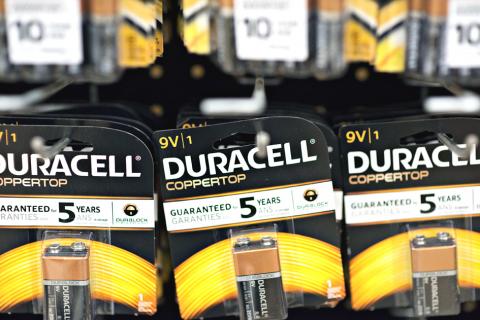Buying Duracell might provide a short-term charge for Berkshire Hathaway Inc, but the battery maker could eventually wind up being a drain on Warren Buffett’s firm as consumers increasingly rely on rechargeable batteries.
Duracell is being sold for roughly US$3 billion because Procter & Gamble Co (P&G) does not consider it one of its top-performing consumer products companies.
“It’s a declining business, which was dragging down the overall growth at Procter,” S&P Capital IQ analyst Joseph Agnese said. Duracell’s disposable battery sales have been shrinking 2 to 4 percent per year, he added.

Photo: Bloomberg
However, demand remains for the single-use batteries that power TV remotes, purring animated cats and many other electronic toys. Some experts say there is plenty of opportunity for Duracell if it can find ways to sell more rechargeables and tap into the market for large batteries used in vehicles and on the power grid.
With Berkshire Hathaway’s vast resources, which included US$62.4 billion cash at the end of September, and its 10 percent stake in Chinese carmaker BYD Co (比亞迪), it is tempting to think of this deal as a play on electric vehicles, Jeff Chamberlain said, who helps direct energy storage research at the Argonne National Laboratory.
“I can’t help but hope that this is going to turn into something that will aim at the bigger picture,” Chamberlain said.
The idea that Berkshire is buying Duracell to turn it into something else does not fit with Buffett’s model of buying quality companies and allowing them to continue doing what they do best. He favors easy-to-understand businesses that have a strong competitive advantage.
“I have always been impressed by Duracell, as a consumer and as a long-term investor in P&G and Gillette,” Buffett said in a statement on Thursday.
Duracell might already be pursuing new opportunities, however. Duracell has been developing lithium-ion batteries for some time, Chamberlain said, and it is a small player in the market for those rechargeable batteries.
Berkshire is to hand over the P&G stock it already owns, which is worth about US$4.7 billion, to acquire Duracell. Offsetting part of that price, P&G is to contribute about US$1.7 billion in cash before the deal closes in the second half of next year.
Author and investor Jeff Matthews, who wrote Warren Buffett’s Successor: Who It Is and Why It Matters, said the deal is a tax-efficient way for Berkshire to sell its P&G stock and avoid capital gains taxes.
However, he is not a big fan of Duracell because of the overall shift to rechargeable batteries.
“I’d rather have the Procter & Gamble shares,” Matthews said. “I think Procter & Gamble will get more valuable over time, and Duracell will get less valuable.”
Berkshire has been a significant P&G shareholder since the consumer products firm acquired Gillette in 2005.
Cincinnati-based P&G said it would take a charge of about US$0.28 per share in its current quarter related to the Duracell deal. The transaction is expected to close in the second half of next year.

To many, Tatu City on the outskirts of Nairobi looks like a success. The first city entirely built by a private company to be operational in east Africa, with about 25,000 people living and working there, it accounts for about two-thirds of all foreign investment in Kenya. Its low-tax status has attracted more than 100 businesses including Heineken, coffee brand Dormans, and the biggest call-center and cold-chain transport firms in the region. However, to some local politicians, Tatu City has looked more like a target for extortion. A parade of governors have demanded land worth millions of dollars in exchange

An Indonesian animated movie is smashing regional box office records and could be set for wider success as it prepares to open beyond the Southeast Asian archipelago’s silver screens. Jumbo — a film based on the adventures of main character, Don, a large orphaned Indonesian boy facing bullying at school — last month became the highest-grossing Southeast Asian animated film, raking in more than US$8 million. Released at the end of March to coincide with the Eid holidays after the Islamic fasting month of Ramadan, the movie has hit 8 million ticket sales, the third-highest in Indonesian cinema history, Film

Taiwan Semiconductor Manufacturing Co’s (TSMC, 台積電) revenue jumped 48 percent last month, underscoring how electronics firms scrambled to acquire essential components before global tariffs took effect. The main chipmaker for Apple Inc and Nvidia Corp reported monthly sales of NT$349.6 billion (US$11.6 billion). That compares with the average analysts’ estimate for a 38 percent rise in second-quarter revenue. US President Donald Trump’s trade war is prompting economists to retool GDP forecasts worldwide, casting doubt over the outlook for everything from iPhone demand to computing and datacenter construction. However, TSMC — a barometer for global tech spending given its central role in the

Alchip Technologies Ltd (世芯), an application-specific integrated circuit (ASIC) designer specializing in server chips, expects revenue to decline this year due to sagging demand for 5-nanometer artificial intelligence (AI) chips from a North America-based major customer, a company executive said yesterday. That would be the first contraction in revenue for Alchip as it has been enjoying strong revenue growth over the past few years, benefiting from cloud-service providers’ moves to reduce dependence on Nvidia Corp’s expensive AI chips by building their own AI accelerator by outsourcing chip design. The 5-nanometer chip was supposed to be a new growth engine as the lifecycle